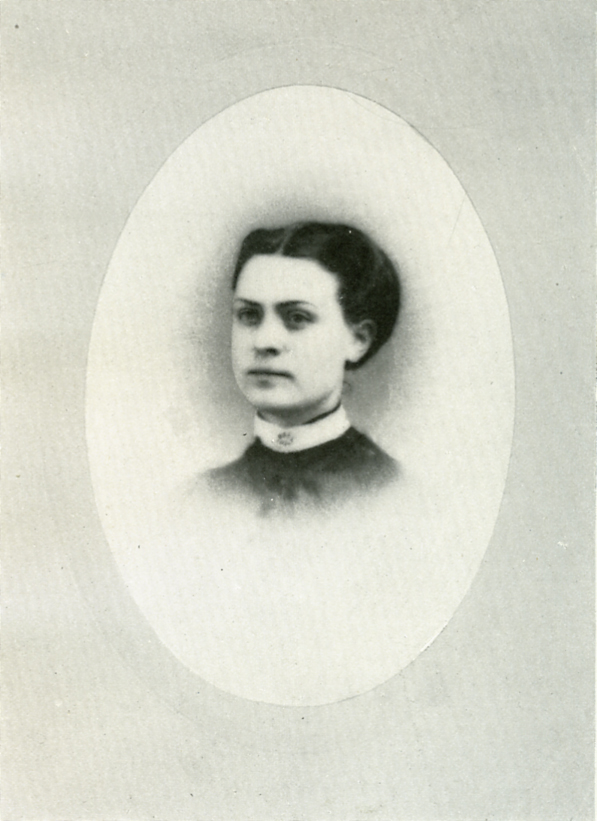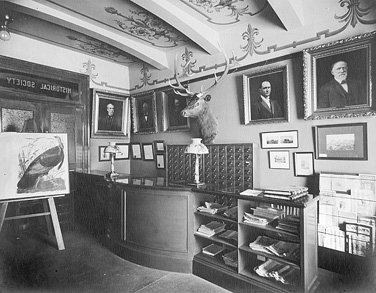
Laura Spencer Howey was a prominent Helena pioneer and activist. Her work as librarian of the State Historical and Miscellaneous Library (now the Montana Historical Society) is her enduring legacy, as she ensured the preservation of thousands of books, documents, and artifacts relevant to Montana’s early history. Her abrupt dismissal from that position in 1907 shows one way that sex discrimination operated in the early twentieth century.
Laura was born in Cadiz, Ohio, in 1851. Her father died when she was young, and her mother taught school to support herself and two young children. A biography of Howey credits her mother as “one of the foremost and best female teachers in that part of Ohio” and a “remarkably well read woman” who raised her children “in the refining atmosphere of books and music.” Laura attended Beaver College, a prominent women’s college in Pennsylvania, where she studied music, French, and drama. While teaching at Harlem Springs College in Ohio, she met fellow professor and her future husband Robert E. Howey.
The Howeys moved to Helena in 1879 so that Robert could take a position as superintendent of schools. Both Laura and Robert were ardent progressives who supported a number of reforms, ranging from women’s education to prostitution reform. Laura was especially active in the temperance movement. She served as the president of the Montana Women’s Christian Temperance Union and was friends with national president Frances Willard.

In 1898 Laura Howey was appointed to the position of head librarian of the Historical and Miscellaneous Department of the Montana State Library. The Montana territorial legislature had approved the establishment of the historical society in 1865, making it the second oldest institution of its kind west of the Mississippi. However, the society had languished in its first three decades. Howey, college-educated and a former trustee of the Helena city library, brought a new sense of professionalism to the society’s library. She created a card catalog, bound the library’s historic newspaper collection, collected and organized state documents, published four volumes of recollections and diaries from Montana’s pioneers, and actively lobbied for funding from both the state legislature and private donors.
But Howey’s tenure as head librarian ended abruptly in 1907 when Montana’s attorney general, Albert Galen, published an opinion finding that a woman could not serve in that position because women did not have the right to vote. He argued, “It being apparent that the Librarian of the Historical Library of the State is a public officer, it necessarily follows that, in order for a person to be eligible to hold such office, he must be qualified to vote at general elections and for state officers in this State, as provided by Section 11, Article IX, of the State Constitution.”
Howey was a prominent and popular figure, and Galen’s opinion drew immediate criticism. The Sheridan Enterprise advised Galen to “Leave Mrs. Howey alone and get busy on your own affairs.” And the Joliet Journal jokingly suggested that Howey should replace Galen: “From our observation, Montana would now be much better equipped in her law department had she elected a woman like Mrs. Howie[sic] to the office of attorney general.” One of the most scathing critiques came from a writer at the Stockgrowers Journal, who (also jokingly) wrote that the injustice of Howey’s dismissal was almost enough to sway him to the cause of women’s suffrage:
If there is one argument, or one condition of affairs, that could move this paper to change its views as to the terrible inexpediency and absolute error of the granting the electorate to the fair but fickle sex, it might be found in this obnoxious ruling of the attorney general. In order that the important office Mrs. Howey now so admirably fills, should be hers till she chose to resign it, we would almost consent to fraternize with that awful [Carrie Chapman] Catt woman and urge female suffrage on a people already blighted through a too wide diffusion of this inestimable privilege. That shows what we think of Mrs. Howey as a public official.
In spite of its unpopularity, Galen’s decision stood. Even as the board of trustees chose her replacement, they adopted a resolution stating their regret that they were legally prevented from rehiring Mrs. Howey and “their high appreciation of the eminent services rendered by Mrs. Howey as Librarian.” According to historian Brian Shovers, the loss of Howey’s leadership was extremely detrimental: “During the next twenty-five years, funding stagnated, collecting slowed, [and] library space gave way to other state offices.”
After her dismissal, Howey continued to be active in the Helena community. She taught civics and mathematics at Helena’s Montana Wesleyan College and engaged in charitable work. She died in 1911 from ongoing heart trouble. Her obituary in the Helena Independent described her as “one of the best known women in the state” and “a woman of marked executive ability” whose “death came as a great shock to hundreds of admiring friends here and many more throughout the state of Montana.” Howey died just three years before women gained the right to vote—and therefore hold office—in Montana. AH
Sources
“Death Claims Popular Woman.” Helena Independent, September 22, 1911, p. 9. Copy in Howey, Laura, Vertical File, Montana Historical Society Research Center, Helena.
Ferguson, Mary C. “Laura Howey.” In Contributions to the Historical Society of Montana with Its Transactions, Officers, and Members, vol. 6. Helena: Independent Publishing Company, 1907, pp. 24A-28A. Copy in Howey, Laura, Vertical File, Montana Historical Society Research Center, Helena.
Galen, Albert, “Opinions of the Attorney General.” Copy in Howey, Laura, Vertical File, Montana Historical Society Research Center, Helena.
Joliet Journal, April 12, 1907. Copy in Howey, Laura, Vertical File. Montana Historical Society Research Center, Helena.
“Mrs. Laura Howey Dies.” Anaconda Standard, September 22, 1911, p. 1.
Petrik, Paula. “Strange Bedfellows: Prostitution, Politicians, and Moral Reform in Helena, 1885-1887.” Montana The Magazine of Western History 35, no. 3 (Summer 1985), pp. 2-13.
Sheridan Enterprise, April 5, 1907. Copy in Howey, Laura, Vertical File, Montana Historical Society Research Center, Helena.
Shovers, Brian. “Saving Montana’s Past: The Creation and Evolution of the Montana Historical Society and Montana The Magazine of Western History.” Montana The Magazine of Western History, 52, no. 1 (Spring 2002), 48-59.